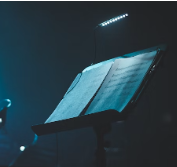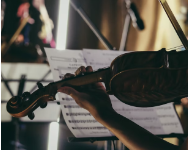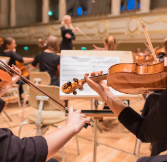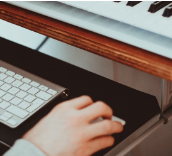The standards for High School Instrumental Music, Intermediate Level enable students to continue to develop musicianship and music literacy. Students identify and document steps of a creative process to develop original music. Music literacy skills are emphasized as students read, notate, and perform music. Students develop more advanced technical skills and improve ensemble skills as they collaborate with others to create and recreate music in ensemble settings. They respond to, describe, interpret, evaluate, perform and sight-read music from a variety of musical styles, composers, cultural influences and historical periods. Students compare and contrast career options in music and make connections between music and other fields of knowledge. Opportunities are provided for students to participate in local, district, regional, and state music events as appropriate to level, ability, and interest. After-school rehearsal and performances are required of all students. Content in this course changes annually; therefore, this course may be repeated.
Beginning Band or Orchestra and/or Director's approval
Essential Question: What individual techniques and ensemble skills are needed to enhance musicianship and musicality in performance?
|
Quarter |
Quarter 1 |
Quarter 2 |
Quarter 3 |
Quarter 4 |
|
Unit Title |
Building on Our Firm Foundation |
New Challenges Lead to New Growth |
Creating and Recreating Music |
Pittin’ on the Ritz |
|
Image Cue |
 |
 |
 |
 |
|
Focus of the Story |
We start the year off by continuing to build on our music literacy skills as we develop a practice routine to promote personal growth. We expand on our knowledge of scales and ability to sight read at increasingly challenging levels as we prepare an etude for an audition. |
Our literature provides new opportunities for increasing difficulty in applying our growing skills as we prepare for performing. Developing a deeper understanding of the historical context of the selections allows us to move beyond just playing the notes to focus on the creative and aesthetic experience. |
Next, we work to develop more advanced technical skills as we create and recreate music as an ensemble. We continue to increase our capacity to describe, interpret, evaluate, perform, and sight read music from various musical styles, composers, cultural influences, and historical periods. |
The year concludes as we explore conducting patterns, improvisation, music technology, and career pathways. Solo and small ensemble projects with end-of-the-year performances allow us to demonstrate our growth as musicians. |
|
Transfer Goals |
Understand and apply creative processes to guide the development of ideas, original works, and musical performance. Understand and find meaning in music as a form of community engagement through involvement as a performer, supporter, advocate, and audience member. Curate a portfolio of accomplishments, experiences, and performance materials exhibiting oneself as an artist. Use music literacy to demonstrate understanding of the elements of music and the ways they inform artistic performance and creative expression. Use technology as a strategic mechanism for improving music literacy and improving music performance. |
Analyze, interpret, and evaluate musical works from a variety of cultures. Understand and find meaning in music as a form of community engagement through involvement as a performer, supporter, advocate, and audience member. Curate a portfolio of accomplishments, experiences, and performance materials exhibiting oneself as an artist. Use music literacy to demonstrate understanding of the elements of music and the ways they inform artistic performance and creative expression. Use technology as a strategic mechanism for improving music literacy and improving music performance. |
Analyze, interpret, and evaluate musical works from a variety of cultures. Understand and find meaning in music as a form of community engagement through involvement as a performer, supporter, advocate, and audience member. Curate a portfolio of accomplishments, experiences, and performance materials exhibiting oneself as an artist. Use music literacy to demonstrate understanding of the elements of music and the ways they inform artistic performance and creative expression. Use technology as a strategic mechanism for improving music literacy and improving music performance. |
Understand and apply creative processes to guide the development of ideas, original works, and musical performance. Analyze, interpret, and evaluate musical works from a variety of cultures. Understand and find meaning in music as a form of community engagement through involvement as a performer, supporter, advocate, and audience member. Explore and connect personal interests, experiences, and aspirations through vocation, advocation, and arts patronage. Curate a portfolio of accomplishments, experiences, and performance materials exhibiting oneself as an artist. Use music literacy to demonstrate understanding of the elements of music and the ways they inform artistic performance and creative expression. Use technology as a strategic mechanism for improving music literacy and improving music performance. |
|
Learning Targets |
I can play scales from the Senior Regional Orchestra scale requirements. I can sight read excerpts from the required etude. I can play excerpts from the required etude. I can sight read musical excerpts. I can play scales from the Senior Regional scale requirements. I can perform the required etude. I can sight read musical excerpts. I can evaluate my performance using the provided rubric. I can reflect on my growth during this unit. |
I can demonstrate good posture. I can use proper technique needed for the concert literature being studied. I can sight read music using an established procedure. I can improvise and compose. I can play excerpts from the concert music. |
I can demonstrate good posture. I can use proper technique needed for literature being studied. I can sight-read music using an established procedure. I can improvise and compose. I can play excerpts from the concert literature. I can demonstrate appropriate stage etiquette at the concert. I can play excerpts from the concert literature I can demonstrate appropriate stage etiquette at the concert |
I can select a quality solo or an ensemble composition that I can timely prepare for a public performance or recording. I can create a preparation plan for my solo project. I can collaborate with other students in preparation for the solo/ensemble performance. I can analyze my solo/ensemble selection from historical and theoretical perspectives. I can apply my knowledge of string techniques, music history, and performance practice to my solo selection. I can prepare a solo/ensemble project. I can perform my solo/ensemble selection in tune, with good sound and technique, and stylistically appropriately. I can perform publicly and record my performance. I can proudly share my performance with my family and friends. |
